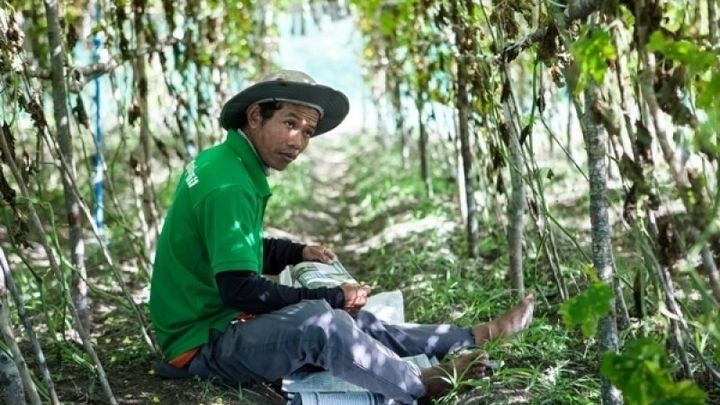
Cambodian organic farm field school
Donation protected
Cette page a une version anglaise et française (en bas), veuillez lire la version que vous préférez.
This page has an english and french version (at the bottom), please read the one you are most comfortable with.
English/ Anglais
Hello and bonjour, we are a team of eight 4th year students in an international agro-development school (ISTOM) in France. We are (top row, left to right) Mamadou Yattassaye, Mohamed-Amin Ben Taarit, Antoine Zahnd (bottom row, left to right) Soumana Djiro, Manon Carré, Manon Lauffenburger, Benoît Bardeur and Anaïs Roger and we are the team MJE Zira and the TINGA association.
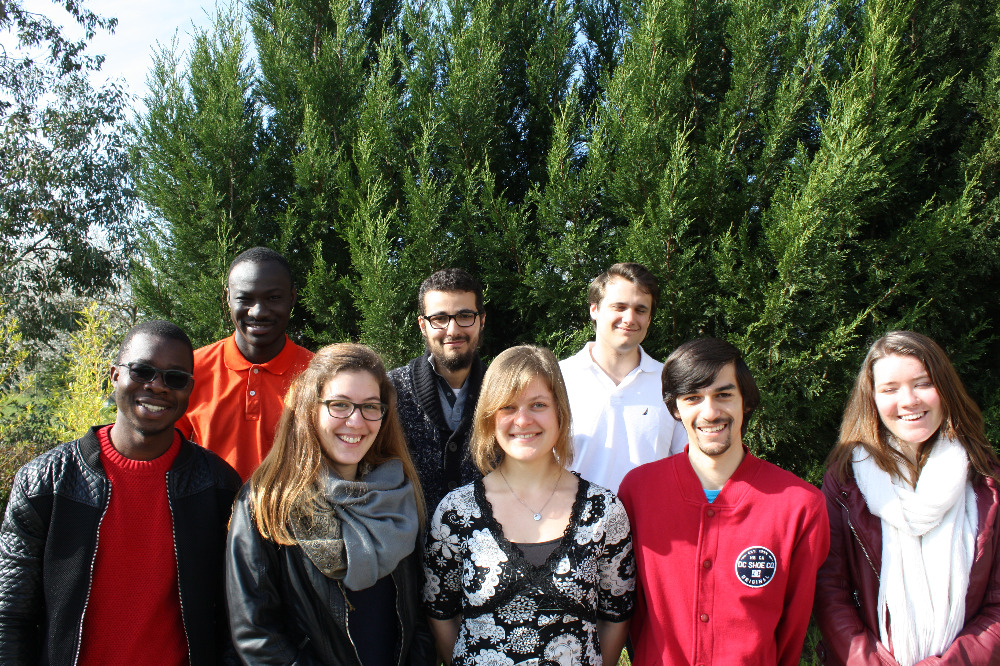
Why raise money?
Each year, 4th year students have to do a project overseas, as part of a junior expert assignement, with development as the main theme. Projects such as a feasibility study of a multi-service platform in Uganda or an impact study on an animal microcredit project in Benin and Togo have been carried out by previous students. This year, it’s our turn. Our project will take place in Cambodia, in the Koh Kong province, in a farm where a farm field school would be created. We will work for a company named Khmer Organic Cooperative (KOC). KOC owns two farms and grows organic fruits and vegetables. These farms are there to experiment organic farming on different crops and see how they react to it (better yield? Smaller cost of production? etc.) as well as be more environmentally friendly.
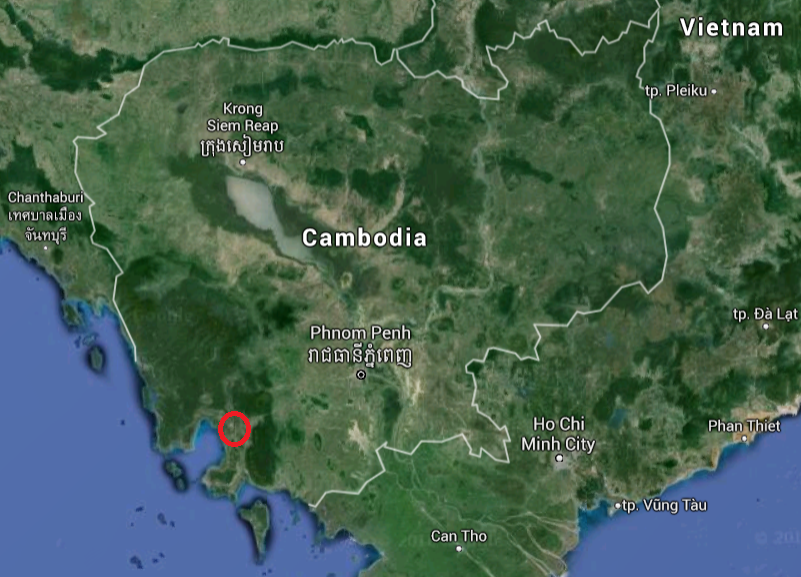
The goal of this project is to convert local farmers to organic farming and teach them the agricultural practices to do so. KOC would like to see this conversion apply to the whole province and in a longer term, to the whole country. This school would become a hub for organic farming in the country. It is a very ambitious project and we would love to participate in its fruition.
However, this project is pretty expensive and we do not have all the funds needed to finance it. We would need a total of $10,978/ 9,659 €. As of the creation of this page we managed to gather some money but we still need $2,842/ 2,500 €.
How will we use the money?
The money raised to help this project will strictly be used to finance it. Things like plane tickets, vaccines, visas and accommodation in Cambodia (housing, food, etc.) are what cost the most.
How soon do we need it?
We plan to leave for Cambodia on the 21st of May, so that leaves us a little less than two months. The project will last until the end of July.
This project is really important for us professional wise. We strongly believe that agriculture is an engine of development and even more so for organic farming. Couple that with education (teaching the farmers how to grow crops organically) and it makes the project even more interesting for us. Furthermore, the environment is respected since the object of the company is the production of organic fruits and vegetables, and as we all know, respecting the environment has become really important nowadays. Limiting the use of harmful chemicals could help take part in resolving this issue. In a few years, Cambodia could become an example for organic farming for countries in South-East Asia. We would really love to be a part of this ambitious project. It is also a new experience for us because none of us have ever been to Cambodia or Asia. We chose this project because not only is it very interesting professional wise but it is also the case experience wise. Cambodia has a wide culture and we would love to discover it. We are very open-minded and we are always ready to discover new things, work with professional people and help farmers find suitable markets for their products.
We would really appreciate it if you could help us. Any amount helps. All donations will not only help us fund our project but it will also help Koh Kong farmers convert to organic farming and make their agricultural practices be more environmentally friendly. We would be very greatful if you could share this page with your family and friends to spread the word.
If you need more information, please visit our website here.
-----------------------------------------------------------------------
French/ Français
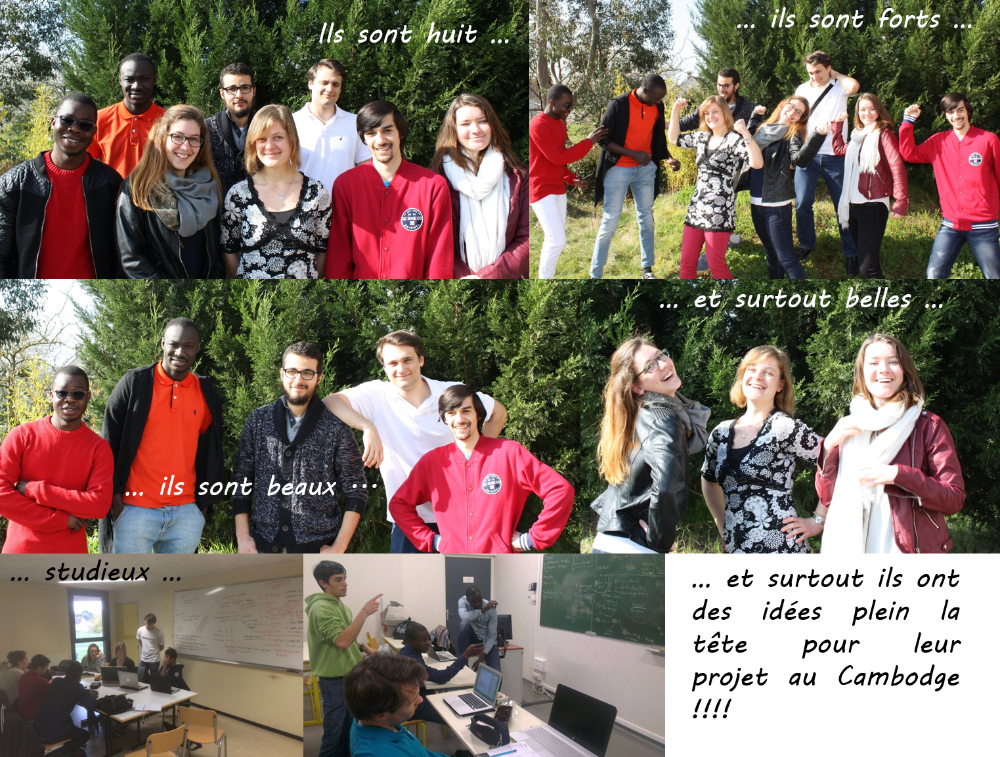
Nous partons 2 mois (mi-mai à mi-juillet) dans une région rurale du Cambodge (Koh Kong) pour y développer l’agriculture biologique auprès des petits producteurs et proposer des fruits et légumes de bonne qualité accessibles à tous.
La MJE Zira
On est un groupe de 8 étudiants ingénieurs en 4ème année à l’ISTOM réunis en une association, TINGA. Nous formons la Mission Jeunes Experts Zira (Baobab en Bambara).
Chaque année, les étudiants de 4ème année doivent mener un projet de développement dans un pays en développement sous forme d'une mission jeunes experts. Les MJE des années précédentes ont réalisé des projets en Ouganda (Etude de faisabilité d’une plateforme multi-service d’appui aux filières locales), au Benin et au Togo (Evaluation de l’impact d’un projet de microcrédit animal), etc.
Cette année, nous préparons un projet de développement pour une coopérative au Cambodge.
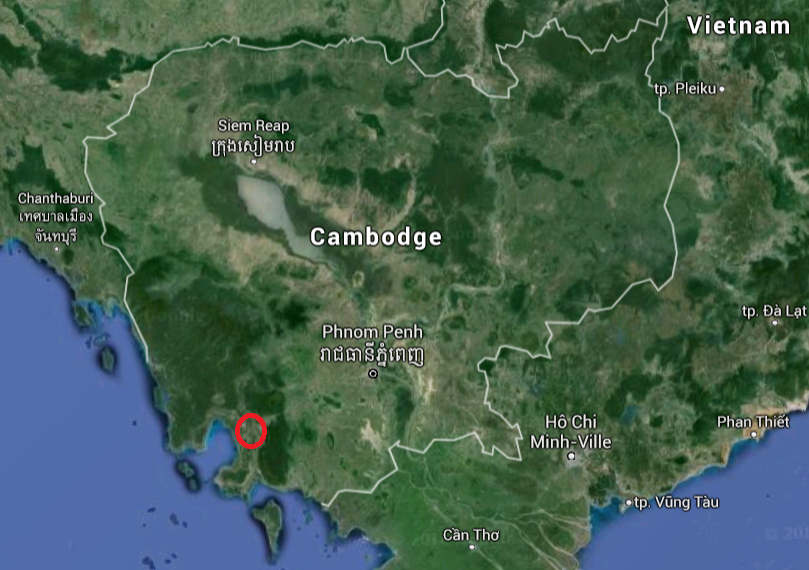
L’équipe
- Benoît, dit Benito le mécano
- Mohamed-Amin, qui hésite entre poterie et pêche au harpon
- Manon C., dit Manhulk ou MC « tu me touches je te BOUFFE !!! »
- Soumana Abdoulaye, dit Monsieur le Ministre la force tranquille
- Manon L., dit Madame « tous à son poste ! »
- Anaïs, dit ananas la douceur incarnée, c’est notre perle de lait à nous
- Mamadou, dit Monsieur, 5 minutes avant le rendu « Non mais les gars, vous ne voulez pas rajouter ça, et ça … ??? »
- Antoine, dit Antointrad ou Banderas « comment tu dis argent en anglais ? comment tu dis radin en espagnol ? comment tu dis merci en russe ? »
Nos actions pour le projet
On va rejoindre l’entreprise Khmer Organic, à une centaine de kilomètres de la capitale, Phnom Penh. Cette coopérative a été créée par un cambodgien philanthrope désireux de développer le bio dans sa région, pour ensuite l’étendre plus largement dans le pays. Il souhaite pour cela mettre en place une ferme-école et apporter des formations aux petits producteurs.
Notre mission est de participer aux premières étapes de ce projet.
Nos idées pour y répondre sont :
- Cibler les pratiques agricoles des producteurs de la région
- Mesurer leur intérêt pour l’agriculture biologique
- Identifier les avantages et les inconvénients d’une conversion vers le biologique
- Proposer des techniques culturales adaptées
- Pour réaliser ce projet, nous avons un budget de l'ordre de 9659 €. Nous avons réussi à réunir de l'argent grâce aux différentes actions que nous avons mené (ventes de repas, demandes de subvention, mécénat, etc.) mais il nous manque encore 2500 € pour compléter ce budget.
A quoi servira la collecte
- Santé (vaccins, médicaments...)
- Billets d’avion
- Visas
- Frais locaux
Ce projet est très important pour nous professionnellement et représente également une nouvelle expérience car nous découvrirons tous un nouveau pays et une nouvelle culture. Le projet nous tient à coeur grâce aux éléments suivants :
- L'éducation (transmettre les techniques de l'agriculture biologique)
- L'agriculture biologique est un moteur du développement
- Absence d'utilisation de produits chimiques
- Respect de l'environnement
On vous remercie d'avance pour votre généreux don. Toute aide est la bienvenue. Merci de partager cette page à vos proches et à vos amis. Pour plus d'informations, veuillez visiter notre site ici.
This page has an english and french version (at the bottom), please read the one you are most comfortable with.
English/ Anglais
Hello and bonjour, we are a team of eight 4th year students in an international agro-development school (ISTOM) in France. We are (top row, left to right) Mamadou Yattassaye, Mohamed-Amin Ben Taarit, Antoine Zahnd (bottom row, left to right) Soumana Djiro, Manon Carré, Manon Lauffenburger, Benoît Bardeur and Anaïs Roger and we are the team MJE Zira and the TINGA association.

Why raise money?
Each year, 4th year students have to do a project overseas, as part of a junior expert assignement, with development as the main theme. Projects such as a feasibility study of a multi-service platform in Uganda or an impact study on an animal microcredit project in Benin and Togo have been carried out by previous students. This year, it’s our turn. Our project will take place in Cambodia, in the Koh Kong province, in a farm where a farm field school would be created. We will work for a company named Khmer Organic Cooperative (KOC). KOC owns two farms and grows organic fruits and vegetables. These farms are there to experiment organic farming on different crops and see how they react to it (better yield? Smaller cost of production? etc.) as well as be more environmentally friendly.

The goal of this project is to convert local farmers to organic farming and teach them the agricultural practices to do so. KOC would like to see this conversion apply to the whole province and in a longer term, to the whole country. This school would become a hub for organic farming in the country. It is a very ambitious project and we would love to participate in its fruition.
However, this project is pretty expensive and we do not have all the funds needed to finance it. We would need a total of $10,978/ 9,659 €. As of the creation of this page we managed to gather some money but we still need $2,842/ 2,500 €.
How will we use the money?
The money raised to help this project will strictly be used to finance it. Things like plane tickets, vaccines, visas and accommodation in Cambodia (housing, food, etc.) are what cost the most.
How soon do we need it?
We plan to leave for Cambodia on the 21st of May, so that leaves us a little less than two months. The project will last until the end of July.
This project is really important for us professional wise. We strongly believe that agriculture is an engine of development and even more so for organic farming. Couple that with education (teaching the farmers how to grow crops organically) and it makes the project even more interesting for us. Furthermore, the environment is respected since the object of the company is the production of organic fruits and vegetables, and as we all know, respecting the environment has become really important nowadays. Limiting the use of harmful chemicals could help take part in resolving this issue. In a few years, Cambodia could become an example for organic farming for countries in South-East Asia. We would really love to be a part of this ambitious project. It is also a new experience for us because none of us have ever been to Cambodia or Asia. We chose this project because not only is it very interesting professional wise but it is also the case experience wise. Cambodia has a wide culture and we would love to discover it. We are very open-minded and we are always ready to discover new things, work with professional people and help farmers find suitable markets for their products.
We would really appreciate it if you could help us. Any amount helps. All donations will not only help us fund our project but it will also help Koh Kong farmers convert to organic farming and make their agricultural practices be more environmentally friendly. We would be very greatful if you could share this page with your family and friends to spread the word.
If you need more information, please visit our website here.
-----------------------------------------------------------------------
French/ Français

Nous partons 2 mois (mi-mai à mi-juillet) dans une région rurale du Cambodge (Koh Kong) pour y développer l’agriculture biologique auprès des petits producteurs et proposer des fruits et légumes de bonne qualité accessibles à tous.
La MJE Zira
On est un groupe de 8 étudiants ingénieurs en 4ème année à l’ISTOM réunis en une association, TINGA. Nous formons la Mission Jeunes Experts Zira (Baobab en Bambara).
Chaque année, les étudiants de 4ème année doivent mener un projet de développement dans un pays en développement sous forme d'une mission jeunes experts. Les MJE des années précédentes ont réalisé des projets en Ouganda (Etude de faisabilité d’une plateforme multi-service d’appui aux filières locales), au Benin et au Togo (Evaluation de l’impact d’un projet de microcrédit animal), etc.
Cette année, nous préparons un projet de développement pour une coopérative au Cambodge.

L’équipe
- Benoît, dit Benito le mécano
- Mohamed-Amin, qui hésite entre poterie et pêche au harpon
- Manon C., dit Manhulk ou MC « tu me touches je te BOUFFE !!! »
- Soumana Abdoulaye, dit Monsieur le Ministre la force tranquille
- Manon L., dit Madame « tous à son poste ! »
- Anaïs, dit ananas la douceur incarnée, c’est notre perle de lait à nous
- Mamadou, dit Monsieur, 5 minutes avant le rendu « Non mais les gars, vous ne voulez pas rajouter ça, et ça … ??? »
- Antoine, dit Antointrad ou Banderas « comment tu dis argent en anglais ? comment tu dis radin en espagnol ? comment tu dis merci en russe ? »
Nos actions pour le projet
On va rejoindre l’entreprise Khmer Organic, à une centaine de kilomètres de la capitale, Phnom Penh. Cette coopérative a été créée par un cambodgien philanthrope désireux de développer le bio dans sa région, pour ensuite l’étendre plus largement dans le pays. Il souhaite pour cela mettre en place une ferme-école et apporter des formations aux petits producteurs.
Notre mission est de participer aux premières étapes de ce projet.
Nos idées pour y répondre sont :
- Cibler les pratiques agricoles des producteurs de la région
- Mesurer leur intérêt pour l’agriculture biologique
- Identifier les avantages et les inconvénients d’une conversion vers le biologique
- Proposer des techniques culturales adaptées
- Pour réaliser ce projet, nous avons un budget de l'ordre de 9659 €. Nous avons réussi à réunir de l'argent grâce aux différentes actions que nous avons mené (ventes de repas, demandes de subvention, mécénat, etc.) mais il nous manque encore 2500 € pour compléter ce budget.
A quoi servira la collecte
- Santé (vaccins, médicaments...)
- Billets d’avion
- Visas
- Frais locaux
Ce projet est très important pour nous professionnellement et représente également une nouvelle expérience car nous découvrirons tous un nouveau pays et une nouvelle culture. Le projet nous tient à coeur grâce aux éléments suivants :
- L'éducation (transmettre les techniques de l'agriculture biologique)
- L'agriculture biologique est un moteur du développement
- Absence d'utilisation de produits chimiques
- Respect de l'environnement
On vous remercie d'avance pour votre généreux don. Toute aide est la bienvenue. Merci de partager cette page à vos proches et à vos amis. Pour plus d'informations, veuillez visiter notre site ici.
Organizer
Antoine Zahnd
Organizer
